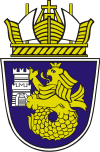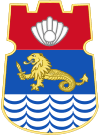Sea-lion

In heraldry, the term sea-lion (sometimes called a morse)[1] refers to a legendary creature that has the head and upper body of a lion, but with webbed forelimbs and a fish tail.[2] These occur most frequently as supporters, but also occur as crests and occasionally as charges.[1] Sea-lions are frequently found in "sejant" or "sejant-erect" (sitting upright) attitudes, but may also be found "naiant" (horizontally, as if swimming) or "assurgeant" (issuing from the waves of the sea).[1]
In the Philippines
The sea-lion is prominent in the heraldic tradition of the Philippines, where it features on the coats of arms of the capital, the primatial see, the seal of the navy, the presidential seal, the seals of the Department of Finance, the Department of Education and other various government offices. It can also be found on the medal of the Philippine Legion of Honor. The heraldic device comes from Manila's colonial arms, where the sea-lion represents the islands as an ultramar (overseas) possession of Spain; the lion is ultimately derived from the arms of Castile and León.
On May 30, 1596, King Philip II of Spain gave the City of Manila its own specific coat of arms:[3]
- "On the upper half of the coat of arms is a castle of gold on a red field, with a door and windows in blue, atop the shield a crown. On the lower half, on a blue field is a figure half lion half dolphin in silver, with colored claws and tongue, holding in its paw an unsheathed sword..."
In other countries
- A sea-lion can be seen on the Crest of the 8th Marine Regiment of the United States Marine Corps.[4]
Gallery
- The carp statue, in front of Chenghuang Temple (城隍廟; Chénghuáng Miào) in Hsinchu City, Taiwan.[5]
- The similar Sea-lion is prominent in the Philippines, where it is featured on the coat-of-arms of its capital, primatial see, and its President's Seal. The heraldic device comes from Manila's colonial arms where the Sea-lion represents the islands as an ultramar (overseas) possession of Spain; the lion is ultimately derived from the arms of Castile and León.

.svg.png) Arms of the colonial Manila, which were sometimes used for colonial Philippines as a whole.
Arms of the colonial Manila, which were sometimes used for colonial Philippines as a whole. Present arms of the City of Manila.
Present arms of the City of Manila. Coat of Arms of the Principality of Sealand.
Coat of Arms of the Principality of Sealand.
See also
References
- 1 2 3 Fox-Davies, Arthur Charles (1909). A Complete Guide to Heraldry. Ill. by Graham Johnston. London & Edinburgh: T.C. & E.C. Jack. p. 186.
- ↑ "Sea lion". Pimbley's Dictionary of Heraldry. Baltimore: Arthur Francis Pimbley. 1908. p. 58. Retrieved 2012-02-29.
- ↑ Ocampo, Ambeth (2012). Looking Back 6: Prehistoric Philippines. Mandaluyong City, Philippines: Anvil Publishing, Inc. p. 21. ISBN 978-971-27-2767-2.
- ↑ I Marine Expeditionary Force (FWD) Official Public Website Archived November 25, 2006, at the Wayback Machine.
- ↑ Hsinchu Carp Statue opening ceremony
External links
- Sea Lion at Mythical Creatures List
- The Ancient Archipelagic Ultramar: Symbol of Manila, the Presidency, and the Philippines
| Wikimedia Commons has media related to Sea lions in heraldry. |